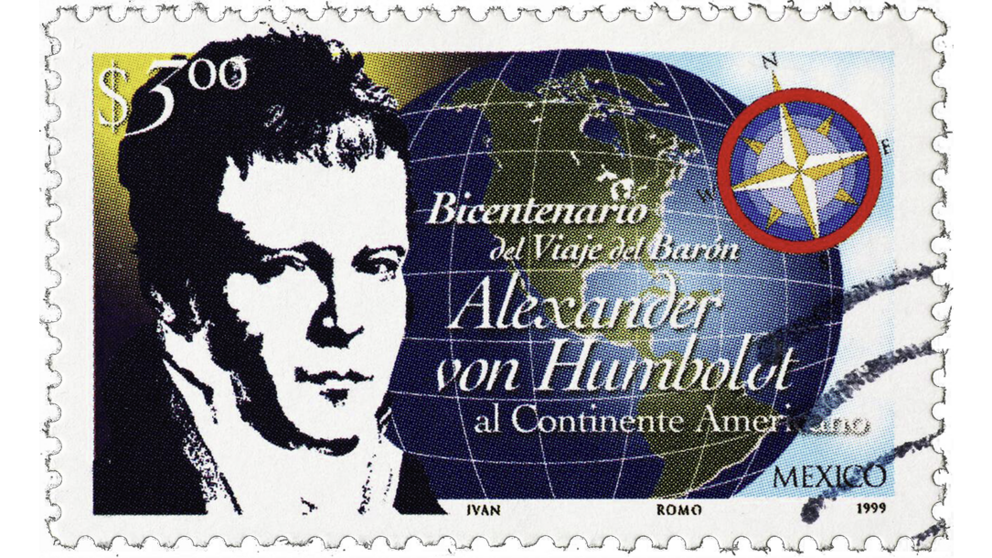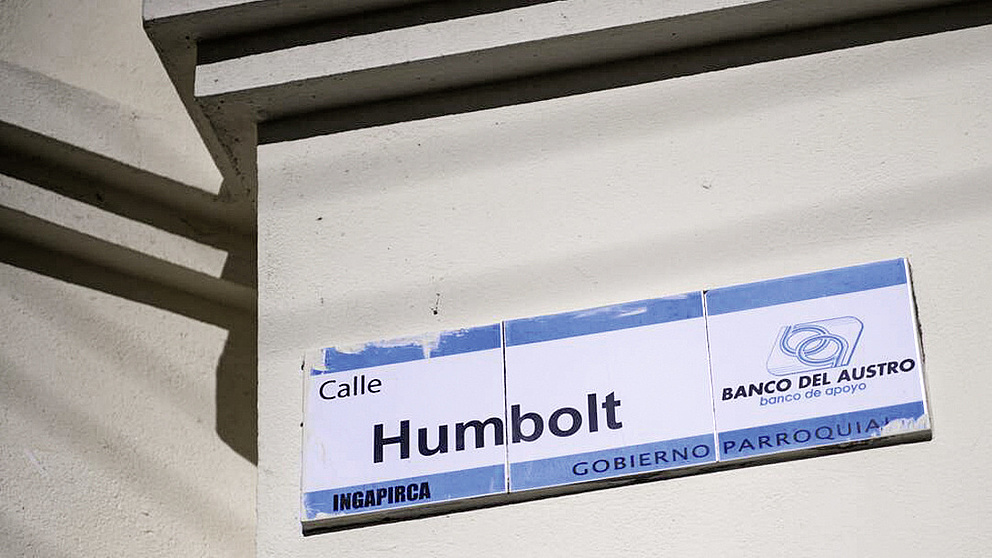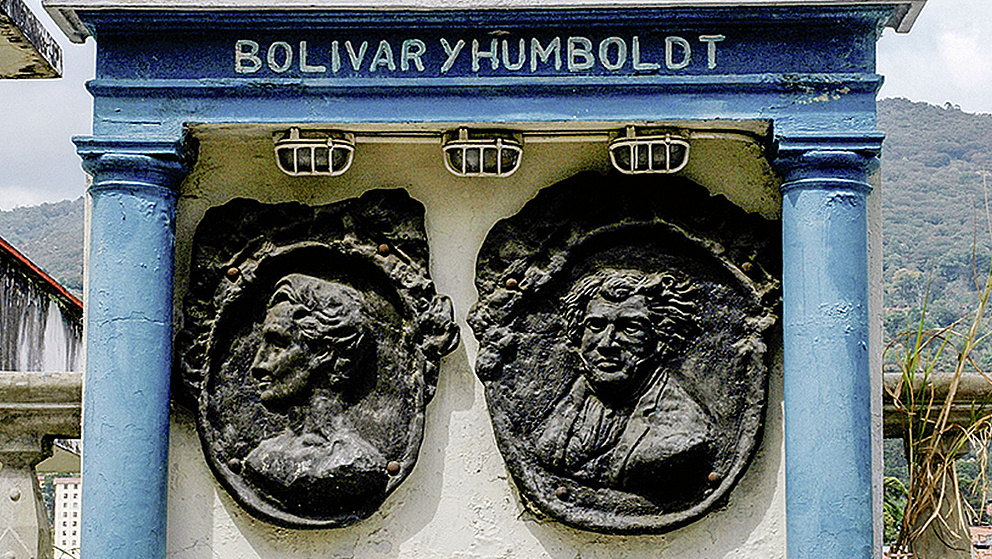Jump to the content
- {{#headlines}}
- {{title}} {{/headlines}}

In the Alexander von Humboldt National Park in the East of Cuba, there is a statue of its namegiver in the Visitors’ Centre at the UNESCO World Heritage site.
Indisputably, Alexander von Humboldt’s name is ubiquitous in Latin America. The Prussian scholar is still of great importance for transatlantic cultural and academic relations to this day, especially in the regions he visited between 1799 and 1804 during his expedition to today’s Venezuela, Cuba, Ecuador, Colombia, Peru and Mexico. But he is no stranger in other parts of America that were not on his itinerary either. The wealth of knowledge about the New World that Humboldt bequeathed us in his many publications, his extensive correspondence, his natural history collections and precise cartographic work is impressive. In it, he drew attention to the social ills of the time and considered how they could be tackled.
“Humboldt was a voice for equality and freedom.”

The study “The Perception of Humboldt in Latin America” is a product of the research programme “Kultur und Außenpolitik” run by the Institut für Auslandsbeziehungen (ifa). The quotations highlighted in this article are taken from the interviews on which it is based and were conducted in Mexico, Venezuela, Cuba, Peru, Colombia, Ecuador und Chile. More on the study: https:// culturalrelations.ifa.de/en/research/ results/percepcion-de-humboldt-eniberoamerica/
But how is Humboldt perceived in the countries of Latin America more than 200 years after his journey? What topics are linked to him? What are the positive associations he evokes and what are the rather more critical aspects? These were the questions asked in a 2019 study initiated by the Federal Foreign Office and ifa – Institut für Auslandsbeziehungen on the 250th anniversary of the explorer’s birth. It emerged that there are, indeed, significant differences both regionally, and between intellectual circles and each country’s population at large. In summary, it can, however, be said that Humboldt’s scientific achievements are seen as positive across countries and classes. According to those taking part in the study, Humboldt had not only collected an impressive amount of scientific data in America but had also portrayed a humane image of the continent. For him, the so-called New World was not only a place for scientific field research but also a region for which he campaigned in diverse ways. Humboldt drew on science to refute the opinion held by European philosophers at the time that it was an inferior and degenerate region. Thanks to him, a considerable share of knowledge about America reached Europe and he made a strong case for including the work of American scholars and discoverers in the international scientific community.

Part of America's history
Emphasis is placed on the political dimension of Humboldt‘s contribution to the emergence of the new nations of Central and South America as he highlighted a path for the scientific, political and economic modernisation of the continent. Particular mention should be made of his social engagement: he openly criticised slavery and the way Indigenous people were treated both at the mission stations and in the mines. He denounced the corruption of the colonial administration as well as the exploitation of the population by the elites. Even today, people are still convinced that Humboldt campaigned for the interests of ordinary people in America, that he is a part of America’s history. That said, the countries of America have their own critical view of Humboldt’s legacy which derives from their specific pasts. Humboldt’s inclusion in the respective (colonial) histories can be better illustrated by taking a closer look at the two countries about which he wrote regional studies: Mexico and Cuba. In Mexico, his work, “Political Essay on the Kingdom of New Spain”, is ascribed a central role in preparing the country for independence. Through this work, Humboldt – described in the study as “the first German-Mexican in history” – also encouraged the population to engage with its history, society and culture. It is, however, also noted that Humboldt’s information about the mineral resources in New Spain had contributed to post-colonial exploitation of these local resources. Critical voices even attest to his role as a propagandist for European investments. Moreover, in Mexico, there is criticism to this day of the fact that geographical and statistical knowledge was passed to the United States government during his visit to Washington and Philadelphia in spring 1804.
“Humboldt is the first German-Mexican in history. He is the most symbolic and extraordinary ambassador the two nations can have.”
In Cuba, too, Humboldt’s regional study, “Political Essay on the Island Cuba”, is attributed great importance. Due to his intensive work on the geographical, statistical and economic situation of the country, he is still often referred to as the “second discoverer” of Cuba. His profound aversion to slavery, to which Humboldt devotes an entire chapter in this work, is viewed particularly positively here, as are his analysis of the island’s economy largely being based on sugar production, and his commitment to sustainable agriculture.
But here, too, there are critical voices pointing out the colonial context in which Humboldt carried out his expedition. His connection to the Spanish crown is emphasised as Humboldt placed his mining expertise at the disposal of the colonial power. That is why it is occasionally questioned whether Humboldt was sufficiently aware of how the information he circulated was being used. When assessing his accomplishments, the view is sometimes also expressed that not enough attention was paid to local scientific circles and other local informants, such as his Indigenous guides. It was by no means in accord with Humboldt’s Enlightenment ideals to work in the context of a colonial government – a system that he fundamentally rejected as can be seen in his personal notes: every colonial government was “a government of mistrust” that did not consider the welfare of the colonies but was geared towards the interests of the empire.

Regional perception
His critical commentaries on the colonial system and the impact on society, however, should on no account be understood as legitimising the independence movement. Humboldt always preferred gradual reform to change a system rather than the violent upheaval of a revolution. Moreover, he was not optimistic in general about the results of revolts, especially when they were initiated by the upper classes. In his opinion, the situation of the most underprivileged groups in society, that is, the Indigenous groups, the slaves and workers in the mines and agriculture, would hardly be improved if the Creole elites came to power. And he was right.

So, what conclusions can be drawn about the way Humboldt is perceived in Latin America today? It is clear that regional differences in the assessment of Humboldt are largely determined by the circumstances of his historic journey to the respective areas. Another important factor is his conscious inclusion in certain national interests, in a process that had already started during his visit there and still continues today. It is an important challenge to understand these socio-political general conditions under which Humboldt conducted his scientific research. It is the only way we can properly assess his work and his importance. To this end, it is neither helpful to idealise and honour him as a hero of Latin American independence nor view him as an instrument of imperialism. Taken alone, each of these perspectives narrows our understanding of Humboldt and his skilful diplomatic and idealistic navigation of the challenges of his time.

Dr Sandra Rebok is an historian of science at the University of California in San Diego, United States. She has been conducting research on Alexander von Humboldt for more than 20 years and has authored numerous publications on Humboldt, including the study quoted here “Percepción de Humboldt en Iberoamérica” that appeared in the 2019 ifa-Edition “Kultur und Außenpolitik”.


